MSBP E-Portfolio: Factors Influencing Talent Retention in Coffee Shops
VerifiedAdded on 2021/04/08
|22
|6228
|117
Report
AI Summary
This report, part of an MSBP e-portfolio, investigates talent retention within the coffee shop sector, focusing on factors influencing employee turnover and challenges faced by businesses. The literature review defines talent and talent management, exploring concepts like compensation, promotion, training, and job quality. The methodology includes interviews with HR managers from four coffee shop companies, and a survey involving store managers, analyzing the impact of factors like promotion, learning opportunities, and pay on talent turnover. Findings reveal that limited finances, challenges in assessing performance, and the need for tailored training are key obstacles. The research also highlights the significance of promotion and learning opportunities in retaining talented employees, offering insights into effective talent management strategies within the coffee shop industry. The study examines the factors affecting talent turnover in coffee shops and how they impact business operations.
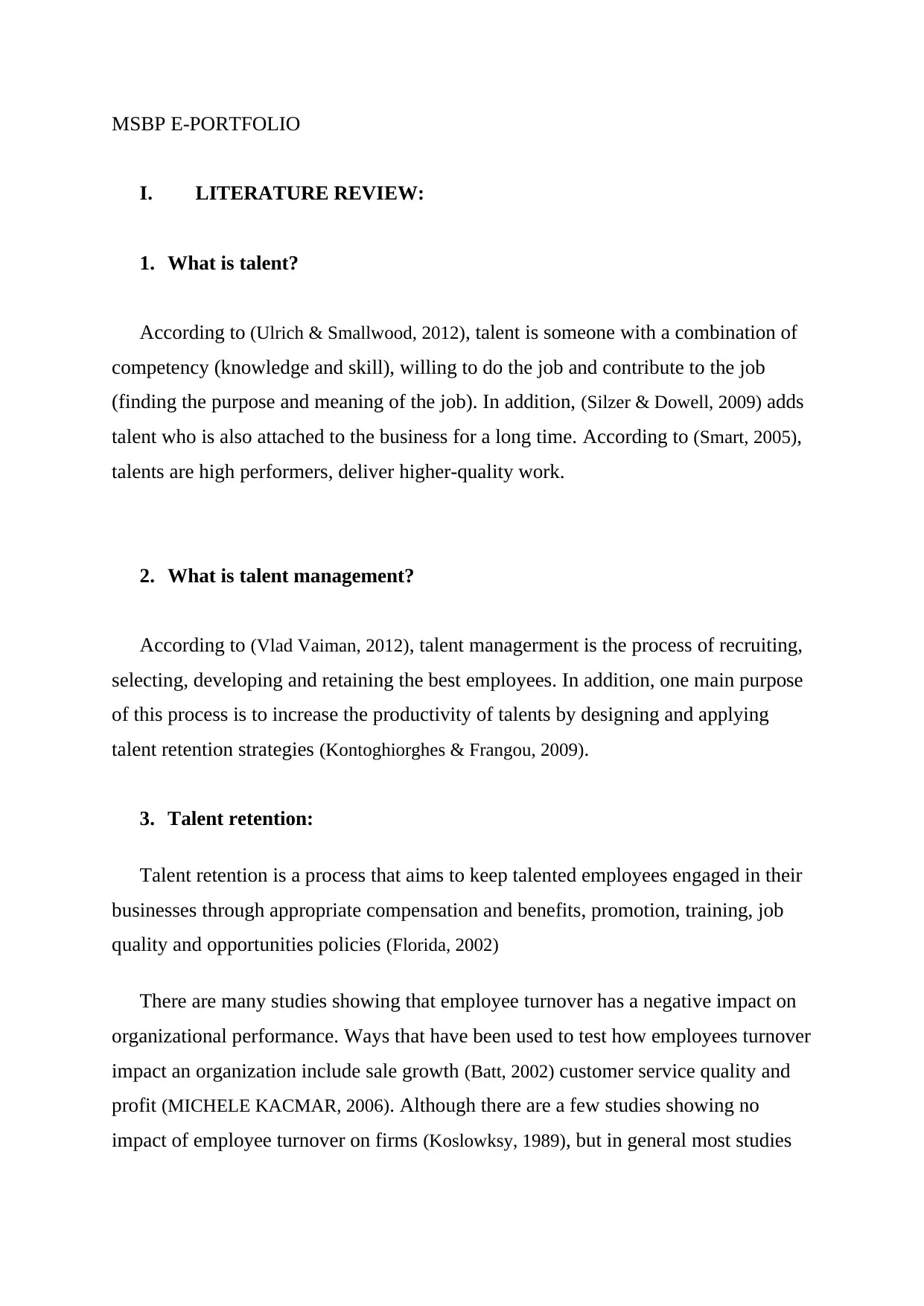
MSBP E-PORTFOLIO
I. LITERATURE REVIEW:
1. What is talent?
According to (Ulrich & Smallwood, 2012), talent is someone with a combination of
competency (knowledge and skill), willing to do the job and contribute to the job
(finding the purpose and meaning of the job). In addition, (Silzer & Dowell, 2009) adds
talent who is also attached to the business for a long time. According to (Smart, 2005),
talents are high performers, deliver higher-quality work.
2. What is talent management?
According to (Vlad Vaiman, 2012), talent managerment is the process of recruiting,
selecting, developing and retaining the best employees. In addition, one main purpose
of this process is to increase the productivity of talents by designing and applying
talent retention strategies (Kontoghiorghes & Frangou, 2009).
3. Talent retention:
Talent retention is a process that aims to keep talented employees engaged in their
businesses through appropriate compensation and benefits, promotion, training, job
quality and opportunities policies (Florida, 2002)
There are many studies showing that employee turnover has a negative impact on
organizational performance. Ways that have been used to test how employees turnover
impact an organization include sale growth (Batt, 2002) customer service quality and
profit (MICHELE KACMAR, 2006). Although there are a few studies showing no
impact of employee turnover on firms (Koslowksy, 1989), but in general most studies
I. LITERATURE REVIEW:
1. What is talent?
According to (Ulrich & Smallwood, 2012), talent is someone with a combination of
competency (knowledge and skill), willing to do the job and contribute to the job
(finding the purpose and meaning of the job). In addition, (Silzer & Dowell, 2009) adds
talent who is also attached to the business for a long time. According to (Smart, 2005),
talents are high performers, deliver higher-quality work.
2. What is talent management?
According to (Vlad Vaiman, 2012), talent managerment is the process of recruiting,
selecting, developing and retaining the best employees. In addition, one main purpose
of this process is to increase the productivity of talents by designing and applying
talent retention strategies (Kontoghiorghes & Frangou, 2009).
3. Talent retention:
Talent retention is a process that aims to keep talented employees engaged in their
businesses through appropriate compensation and benefits, promotion, training, job
quality and opportunities policies (Florida, 2002)
There are many studies showing that employee turnover has a negative impact on
organizational performance. Ways that have been used to test how employees turnover
impact an organization include sale growth (Batt, 2002) customer service quality and
profit (MICHELE KACMAR, 2006). Although there are a few studies showing no
impact of employee turnover on firms (Koslowksy, 1989), but in general most studies
Paraphrase This Document
Need a fresh take? Get an instant paraphrase of this document with our AI Paraphraser
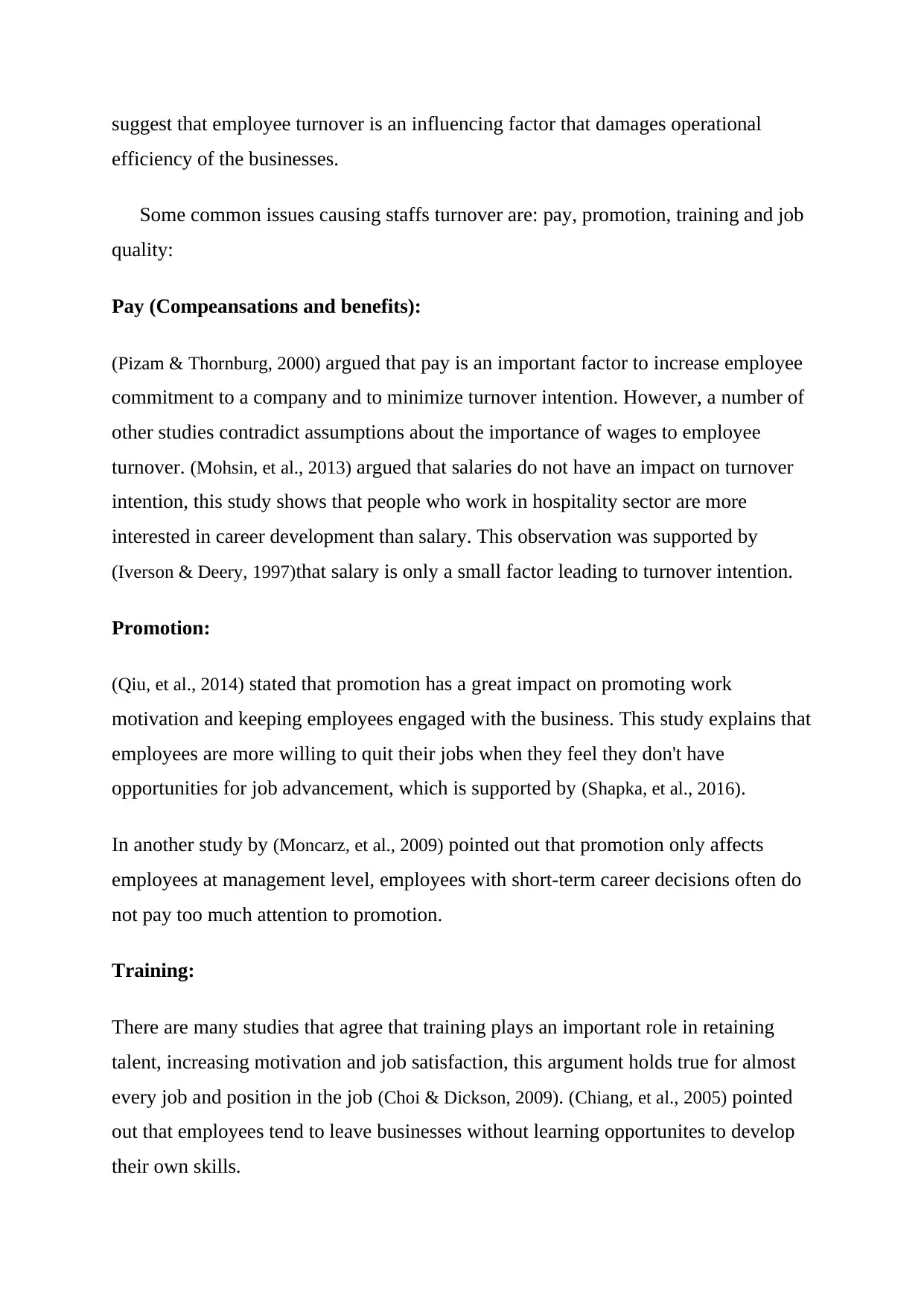
suggest that employee turnover is an influencing factor that damages operational
efficiency of the businesses.
Some common issues causing staffs turnover are: pay, promotion, training and job
quality:
Pay (Compeansations and benefits):
(Pizam & Thornburg, 2000) argued that pay is an important factor to increase employee
commitment to a company and to minimize turnover intention. However, a number of
other studies contradict assumptions about the importance of wages to employee
turnover. (Mohsin, et al., 2013) argued that salaries do not have an impact on turnover
intention, this study shows that people who work in hospitality sector are more
interested in career development than salary. This observation was supported by
(Iverson & Deery, 1997)that salary is only a small factor leading to turnover intention.
Promotion:
(Qiu, et al., 2014) stated that promotion has a great impact on promoting work
motivation and keeping employees engaged with the business. This study explains that
employees are more willing to quit their jobs when they feel they don't have
opportunities for job advancement, which is supported by (Shapka, et al., 2016).
In another study by (Moncarz, et al., 2009) pointed out that promotion only affects
employees at management level, employees with short-term career decisions often do
not pay too much attention to promotion.
Training:
There are many studies that agree that training plays an important role in retaining
talent, increasing motivation and job satisfaction, this argument holds true for almost
every job and position in the job (Choi & Dickson, 2009). (Chiang, et al., 2005) pointed
out that employees tend to leave businesses without learning opportunites to develop
their own skills.
efficiency of the businesses.
Some common issues causing staffs turnover are: pay, promotion, training and job
quality:
Pay (Compeansations and benefits):
(Pizam & Thornburg, 2000) argued that pay is an important factor to increase employee
commitment to a company and to minimize turnover intention. However, a number of
other studies contradict assumptions about the importance of wages to employee
turnover. (Mohsin, et al., 2013) argued that salaries do not have an impact on turnover
intention, this study shows that people who work in hospitality sector are more
interested in career development than salary. This observation was supported by
(Iverson & Deery, 1997)that salary is only a small factor leading to turnover intention.
Promotion:
(Qiu, et al., 2014) stated that promotion has a great impact on promoting work
motivation and keeping employees engaged with the business. This study explains that
employees are more willing to quit their jobs when they feel they don't have
opportunities for job advancement, which is supported by (Shapka, et al., 2016).
In another study by (Moncarz, et al., 2009) pointed out that promotion only affects
employees at management level, employees with short-term career decisions often do
not pay too much attention to promotion.
Training:
There are many studies that agree that training plays an important role in retaining
talent, increasing motivation and job satisfaction, this argument holds true for almost
every job and position in the job (Choi & Dickson, 2009). (Chiang, et al., 2005) pointed
out that employees tend to leave businesses without learning opportunites to develop
their own skills.
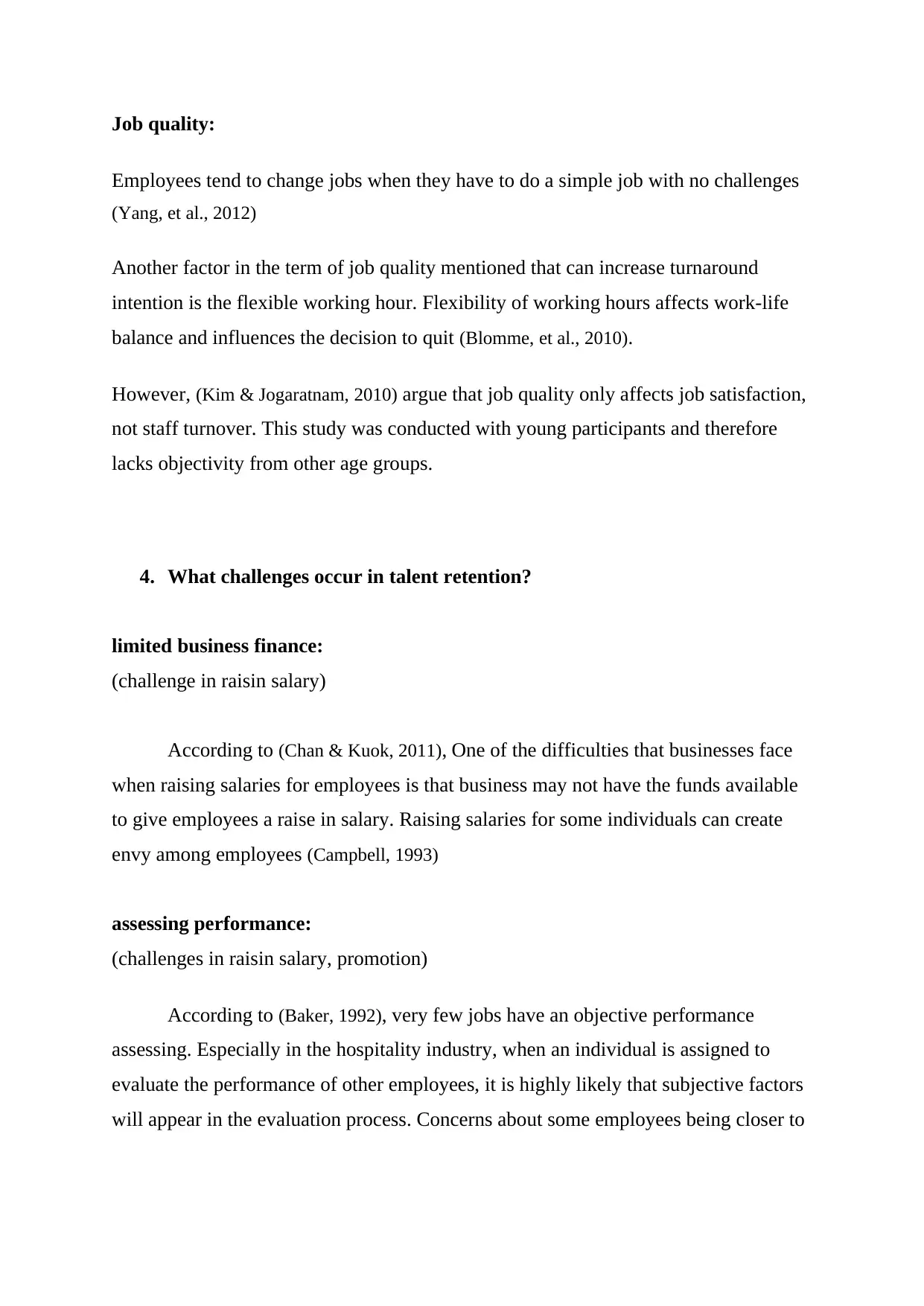
Job quality:
Employees tend to change jobs when they have to do a simple job with no challenges
(Yang, et al., 2012)
Another factor in the term of job quality mentioned that can increase turnaround
intention is the flexible working hour. Flexibility of working hours affects work-life
balance and influences the decision to quit (Blomme, et al., 2010).
However, (Kim & Jogaratnam, 2010) argue that job quality only affects job satisfaction,
not staff turnover. This study was conducted with young participants and therefore
lacks objectivity from other age groups.
4. What challenges occur in talent retention?
limited business finance:
(challenge in raisin salary)
According to (Chan & Kuok, 2011), One of the difficulties that businesses face
when raising salaries for employees is that business may not have the funds available
to give employees a raise in salary. Raising salaries for some individuals can create
envy among employees (Campbell, 1993)
assessing performance:
(challenges in raisin salary, promotion)
According to (Baker, 1992), very few jobs have an objective performance
assessing. Especially in the hospitality industry, when an individual is assigned to
evaluate the performance of other employees, it is highly likely that subjective factors
will appear in the evaluation process. Concerns about some employees being closer to
Employees tend to change jobs when they have to do a simple job with no challenges
(Yang, et al., 2012)
Another factor in the term of job quality mentioned that can increase turnaround
intention is the flexible working hour. Flexibility of working hours affects work-life
balance and influences the decision to quit (Blomme, et al., 2010).
However, (Kim & Jogaratnam, 2010) argue that job quality only affects job satisfaction,
not staff turnover. This study was conducted with young participants and therefore
lacks objectivity from other age groups.
4. What challenges occur in talent retention?
limited business finance:
(challenge in raisin salary)
According to (Chan & Kuok, 2011), One of the difficulties that businesses face
when raising salaries for employees is that business may not have the funds available
to give employees a raise in salary. Raising salaries for some individuals can create
envy among employees (Campbell, 1993)
assessing performance:
(challenges in raisin salary, promotion)
According to (Baker, 1992), very few jobs have an objective performance
assessing. Especially in the hospitality industry, when an individual is assigned to
evaluate the performance of other employees, it is highly likely that subjective factors
will appear in the evaluation process. Concerns about some employees being closer to
⊘ This is a preview!⊘
Do you want full access?
Subscribe today to unlock all pages.

Trusted by 1+ million students worldwide
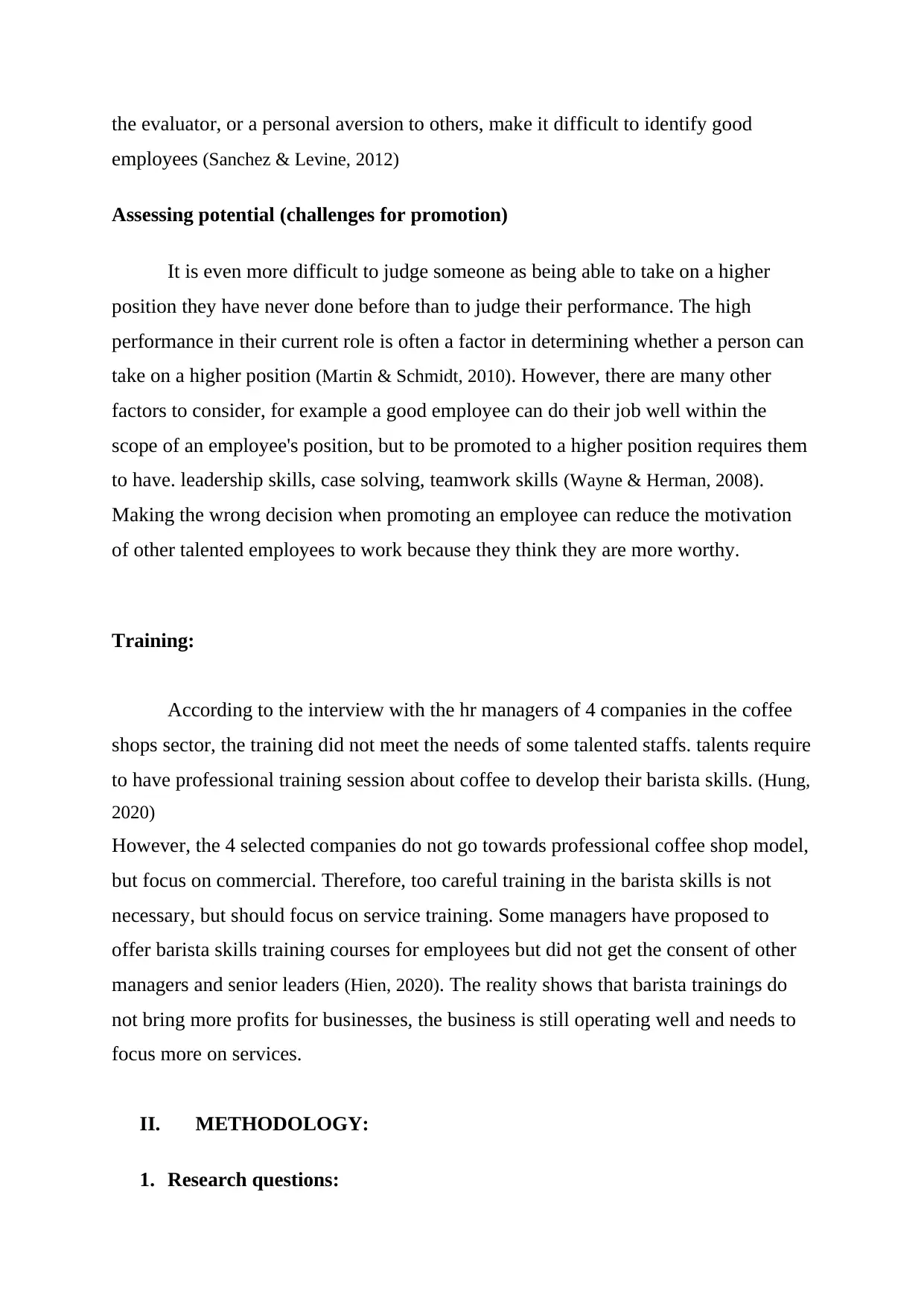
the evaluator, or a personal aversion to others, make it difficult to identify good
employees (Sanchez & Levine, 2012)
Assessing potential (challenges for promotion)
It is even more difficult to judge someone as being able to take on a higher
position they have never done before than to judge their performance. The high
performance in their current role is often a factor in determining whether a person can
take on a higher position (Martin & Schmidt, 2010). However, there are many other
factors to consider, for example a good employee can do their job well within the
scope of an employee's position, but to be promoted to a higher position requires them
to have. leadership skills, case solving, teamwork skills (Wayne & Herman, 2008).
Making the wrong decision when promoting an employee can reduce the motivation
of other talented employees to work because they think they are more worthy.
Training:
According to the interview with the hr managers of 4 companies in the coffee
shops sector, the training did not meet the needs of some talented staffs. talents require
to have professional training session about coffee to develop their barista skills. (Hung,
2020)
However, the 4 selected companies do not go towards professional coffee shop model,
but focus on commercial. Therefore, too careful training in the barista skills is not
necessary, but should focus on service training. Some managers have proposed to
offer barista skills training courses for employees but did not get the consent of other
managers and senior leaders (Hien, 2020). The reality shows that barista trainings do
not bring more profits for businesses, the business is still operating well and needs to
focus more on services.
II. METHODOLOGY:
1. Research questions:
employees (Sanchez & Levine, 2012)
Assessing potential (challenges for promotion)
It is even more difficult to judge someone as being able to take on a higher
position they have never done before than to judge their performance. The high
performance in their current role is often a factor in determining whether a person can
take on a higher position (Martin & Schmidt, 2010). However, there are many other
factors to consider, for example a good employee can do their job well within the
scope of an employee's position, but to be promoted to a higher position requires them
to have. leadership skills, case solving, teamwork skills (Wayne & Herman, 2008).
Making the wrong decision when promoting an employee can reduce the motivation
of other talented employees to work because they think they are more worthy.
Training:
According to the interview with the hr managers of 4 companies in the coffee
shops sector, the training did not meet the needs of some talented staffs. talents require
to have professional training session about coffee to develop their barista skills. (Hung,
2020)
However, the 4 selected companies do not go towards professional coffee shop model,
but focus on commercial. Therefore, too careful training in the barista skills is not
necessary, but should focus on service training. Some managers have proposed to
offer barista skills training courses for employees but did not get the consent of other
managers and senior leaders (Hien, 2020). The reality shows that barista trainings do
not bring more profits for businesses, the business is still operating well and needs to
focus more on services.
II. METHODOLOGY:
1. Research questions:
Paraphrase This Document
Need a fresh take? Get an instant paraphrase of this document with our AI Paraphraser
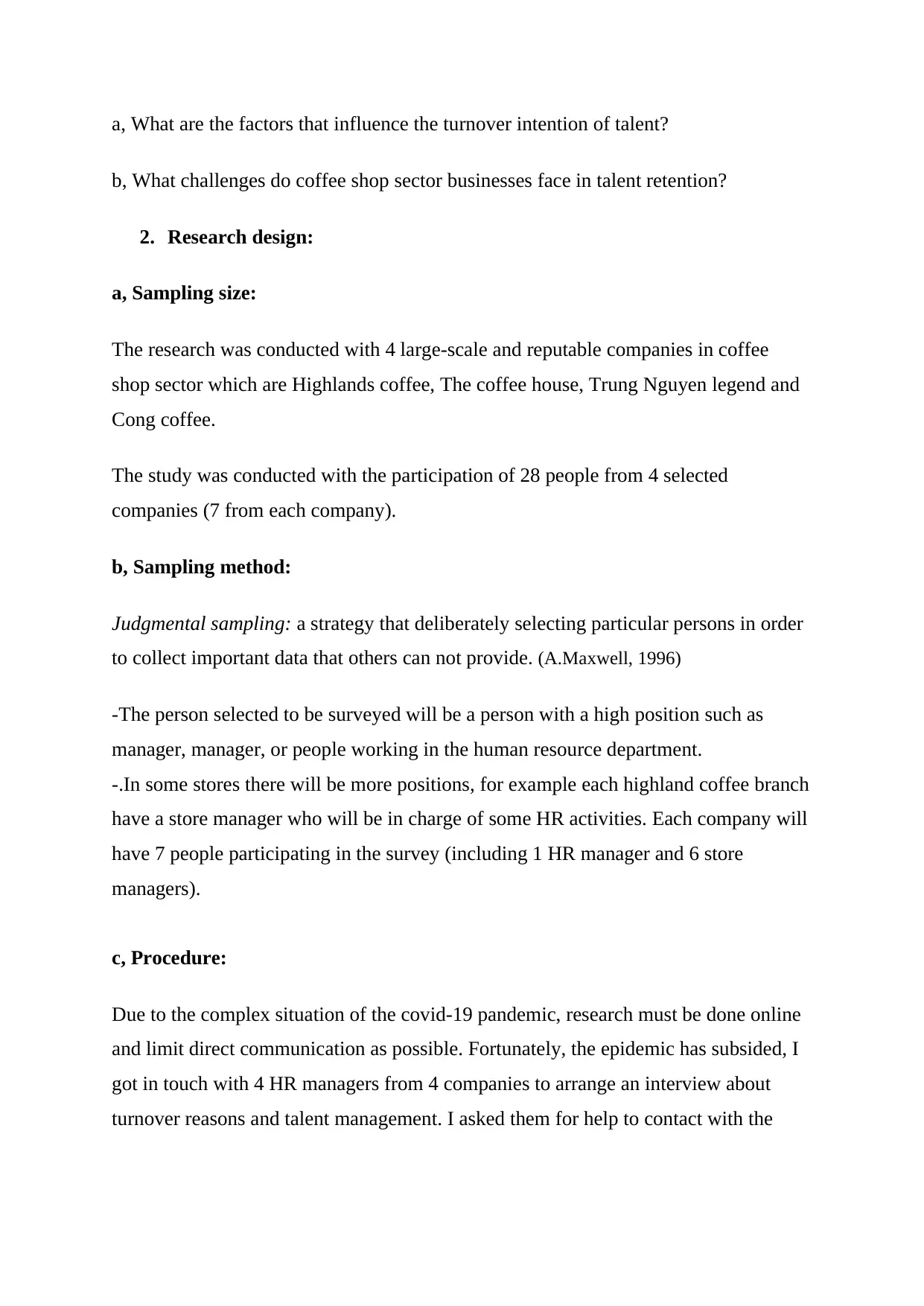
a, What are the factors that influence the turnover intention of talent?
b, What challenges do coffee shop sector businesses face in talent retention?
2. Research design:
a, Sampling size:
The research was conducted with 4 large-scale and reputable companies in coffee
shop sector which are Highlands coffee, The coffee house, Trung Nguyen legend and
Cong coffee.
The study was conducted with the participation of 28 people from 4 selected
companies (7 from each company).
b, Sampling method:
Judgmental sampling: a strategy that deliberately selecting particular persons in order
to collect important data that others can not provide. (A.Maxwell, 1996)
-The person selected to be surveyed will be a person with a high position such as
manager, manager, or people working in the human resource department.
-.In some stores there will be more positions, for example each highland coffee branch
have a store manager who will be in charge of some HR activities. Each company will
have 7 people participating in the survey (including 1 HR manager and 6 store
managers).
c, Procedure:
Due to the complex situation of the covid-19 pandemic, research must be done online
and limit direct communication as possible. Fortunately, the epidemic has subsided, I
got in touch with 4 HR managers from 4 companies to arrange an interview about
turnover reasons and talent management. I asked them for help to contact with the
b, What challenges do coffee shop sector businesses face in talent retention?
2. Research design:
a, Sampling size:
The research was conducted with 4 large-scale and reputable companies in coffee
shop sector which are Highlands coffee, The coffee house, Trung Nguyen legend and
Cong coffee.
The study was conducted with the participation of 28 people from 4 selected
companies (7 from each company).
b, Sampling method:
Judgmental sampling: a strategy that deliberately selecting particular persons in order
to collect important data that others can not provide. (A.Maxwell, 1996)
-The person selected to be surveyed will be a person with a high position such as
manager, manager, or people working in the human resource department.
-.In some stores there will be more positions, for example each highland coffee branch
have a store manager who will be in charge of some HR activities. Each company will
have 7 people participating in the survey (including 1 HR manager and 6 store
managers).
c, Procedure:
Due to the complex situation of the covid-19 pandemic, research must be done online
and limit direct communication as possible. Fortunately, the epidemic has subsided, I
got in touch with 4 HR managers from 4 companies to arrange an interview about
turnover reasons and talent management. I asked them for help to contact with the
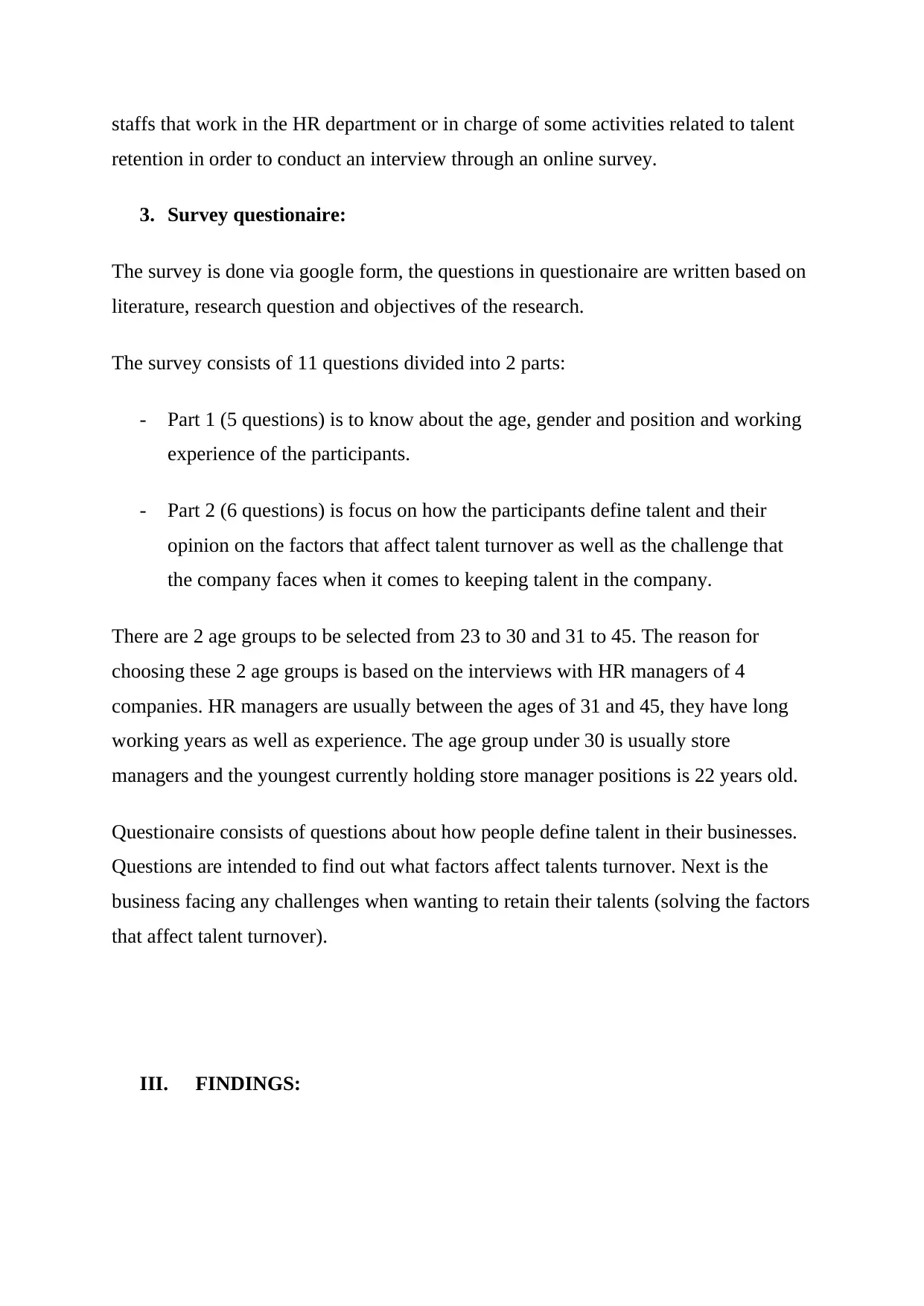
staffs that work in the HR department or in charge of some activities related to talent
retention in order to conduct an interview through an online survey.
3. Survey questionaire:
The survey is done via google form, the questions in questionaire are written based on
literature, research question and objectives of the research.
The survey consists of 11 questions divided into 2 parts:
- Part 1 (5 questions) is to know about the age, gender and position and working
experience of the participants.
- Part 2 (6 questions) is focus on how the participants define talent and their
opinion on the factors that affect talent turnover as well as the challenge that
the company faces when it comes to keeping talent in the company.
There are 2 age groups to be selected from 23 to 30 and 31 to 45. The reason for
choosing these 2 age groups is based on the interviews with HR managers of 4
companies. HR managers are usually between the ages of 31 and 45, they have long
working years as well as experience. The age group under 30 is usually store
managers and the youngest currently holding store manager positions is 22 years old.
Questionaire consists of questions about how people define talent in their businesses.
Questions are intended to find out what factors affect talents turnover. Next is the
business facing any challenges when wanting to retain their talents (solving the factors
that affect talent turnover).
III. FINDINGS:
retention in order to conduct an interview through an online survey.
3. Survey questionaire:
The survey is done via google form, the questions in questionaire are written based on
literature, research question and objectives of the research.
The survey consists of 11 questions divided into 2 parts:
- Part 1 (5 questions) is to know about the age, gender and position and working
experience of the participants.
- Part 2 (6 questions) is focus on how the participants define talent and their
opinion on the factors that affect talent turnover as well as the challenge that
the company faces when it comes to keeping talent in the company.
There are 2 age groups to be selected from 23 to 30 and 31 to 45. The reason for
choosing these 2 age groups is based on the interviews with HR managers of 4
companies. HR managers are usually between the ages of 31 and 45, they have long
working years as well as experience. The age group under 30 is usually store
managers and the youngest currently holding store manager positions is 22 years old.
Questionaire consists of questions about how people define talent in their businesses.
Questions are intended to find out what factors affect talents turnover. Next is the
business facing any challenges when wanting to retain their talents (solving the factors
that affect talent turnover).
III. FINDINGS:
⊘ This is a preview!⊘
Do you want full access?
Subscribe today to unlock all pages.

Trusted by 1+ million students worldwide
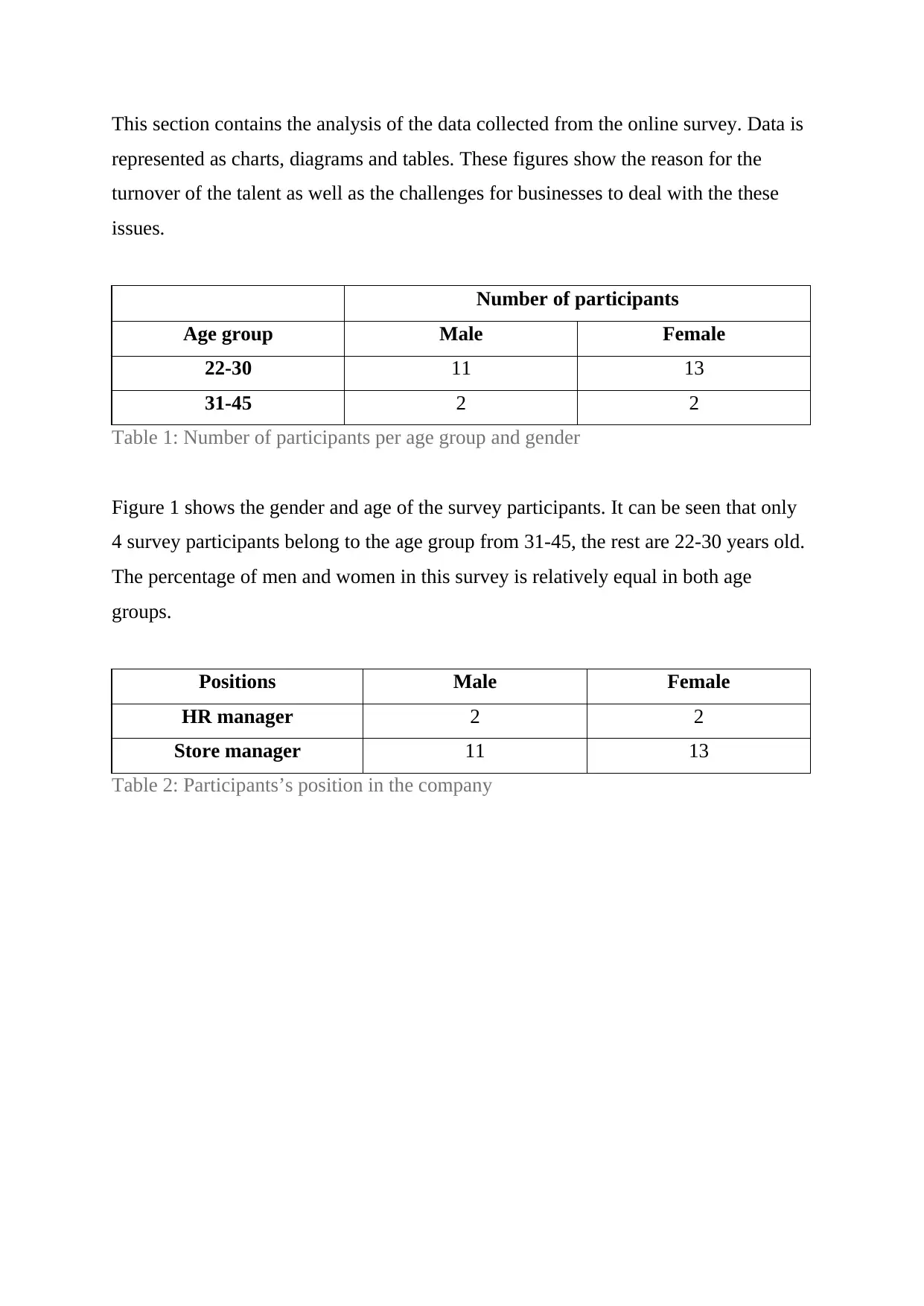
This section contains the analysis of the data collected from the online survey. Data is
represented as charts, diagrams and tables. These figures show the reason for the
turnover of the talent as well as the challenges for businesses to deal with the these
issues.
Number of participants
Age group Male Female
22-30 11 13
31-45 2 2
Table 1: Number of participants per age group and gender
Figure 1 shows the gender and age of the survey participants. It can be seen that only
4 survey participants belong to the age group from 31-45, the rest are 22-30 years old.
The percentage of men and women in this survey is relatively equal in both age
groups.
Positions Male Female
HR manager 2 2
Store manager 11 13
Table 2: Participants’s position in the company
represented as charts, diagrams and tables. These figures show the reason for the
turnover of the talent as well as the challenges for businesses to deal with the these
issues.
Number of participants
Age group Male Female
22-30 11 13
31-45 2 2
Table 1: Number of participants per age group and gender
Figure 1 shows the gender and age of the survey participants. It can be seen that only
4 survey participants belong to the age group from 31-45, the rest are 22-30 years old.
The percentage of men and women in this survey is relatively equal in both age
groups.
Positions Male Female
HR manager 2 2
Store manager 11 13
Table 2: Participants’s position in the company
Paraphrase This Document
Need a fresh take? Get an instant paraphrase of this document with our AI Paraphraser
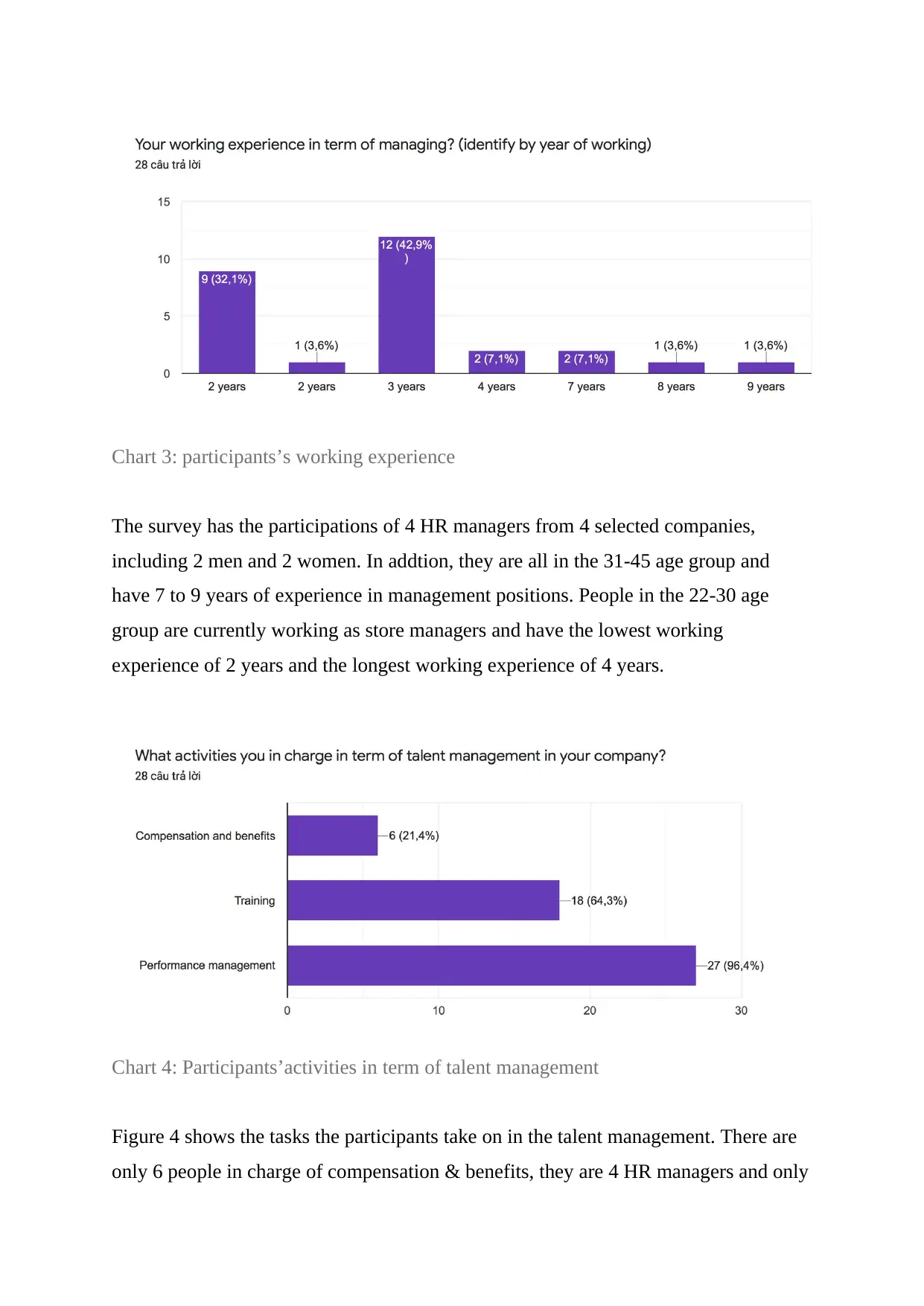
Chart 3: participants’s working experience
The survey has the participations of 4 HR managers from 4 selected companies,
including 2 men and 2 women. In addtion, they are all in the 31-45 age group and
have 7 to 9 years of experience in management positions. People in the 22-30 age
group are currently working as store managers and have the lowest working
experience of 2 years and the longest working experience of 4 years.
Chart 4: Participants’activities in term of talent management
Figure 4 shows the tasks the participants take on in the talent management. There are
only 6 people in charge of compensation & benefits, they are 4 HR managers and only
The survey has the participations of 4 HR managers from 4 selected companies,
including 2 men and 2 women. In addtion, they are all in the 31-45 age group and
have 7 to 9 years of experience in management positions. People in the 22-30 age
group are currently working as store managers and have the lowest working
experience of 2 years and the longest working experience of 4 years.
Chart 4: Participants’activities in term of talent management
Figure 4 shows the tasks the participants take on in the talent management. There are
only 6 people in charge of compensation & benefits, they are 4 HR managers and only
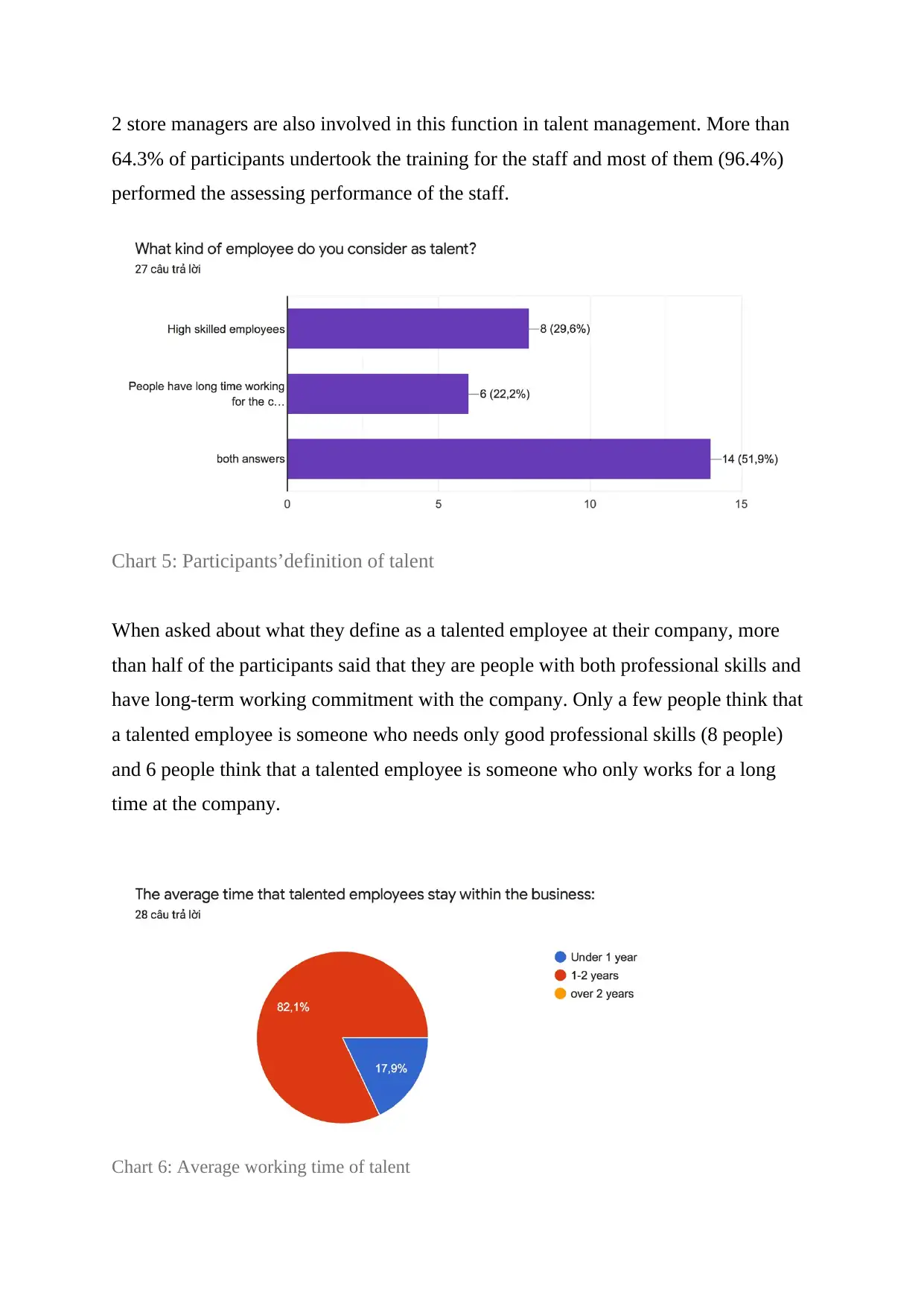
2 store managers are also involved in this function in talent management. More than
64.3% of participants undertook the training for the staff and most of them (96.4%)
performed the assessing performance of the staff.
Chart 5: Participants’definition of talent
When asked about what they define as a talented employee at their company, more
than half of the participants said that they are people with both professional skills and
have long-term working commitment with the company. Only a few people think that
a talented employee is someone who needs only good professional skills (8 people)
and 6 people think that a talented employee is someone who only works for a long
time at the company.
Chart 6: Average working time of talent
64.3% of participants undertook the training for the staff and most of them (96.4%)
performed the assessing performance of the staff.
Chart 5: Participants’definition of talent
When asked about what they define as a talented employee at their company, more
than half of the participants said that they are people with both professional skills and
have long-term working commitment with the company. Only a few people think that
a talented employee is someone who needs only good professional skills (8 people)
and 6 people think that a talented employee is someone who only works for a long
time at the company.
Chart 6: Average working time of talent
⊘ This is a preview!⊘
Do you want full access?
Subscribe today to unlock all pages.

Trusted by 1+ million students worldwide
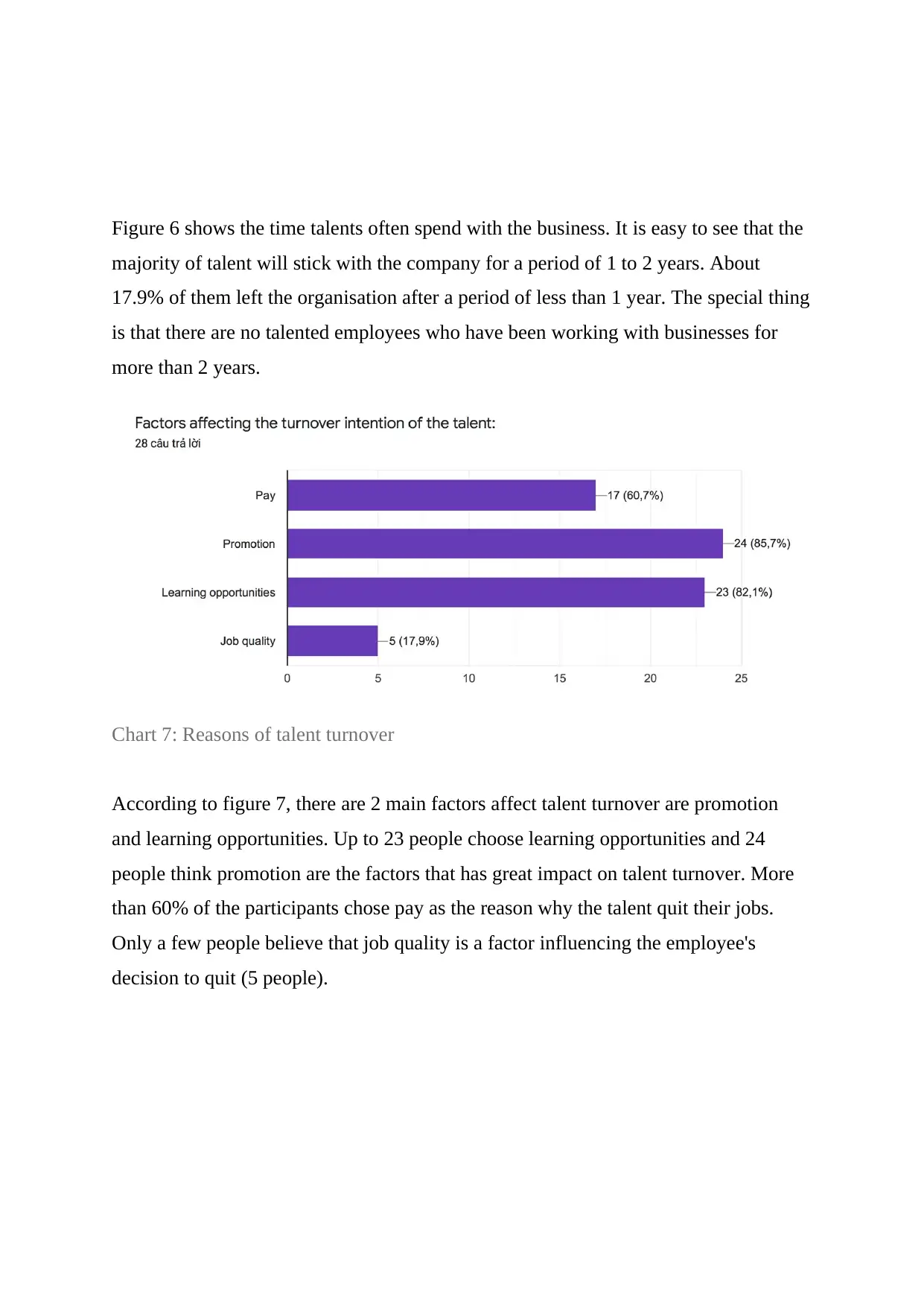
Figure 6 shows the time talents often spend with the business. It is easy to see that the
majority of talent will stick with the company for a period of 1 to 2 years. About
17.9% of them left the organisation after a period of less than 1 year. The special thing
is that there are no talented employees who have been working with businesses for
more than 2 years.
Chart 7: Reasons of talent turnover
According to figure 7, there are 2 main factors affect talent turnover are promotion
and learning opportunities. Up to 23 people choose learning opportunities and 24
people think promotion are the factors that has great impact on talent turnover. More
than 60% of the participants chose pay as the reason why the talent quit their jobs.
Only a few people believe that job quality is a factor influencing the employee's
decision to quit (5 people).
majority of talent will stick with the company for a period of 1 to 2 years. About
17.9% of them left the organisation after a period of less than 1 year. The special thing
is that there are no talented employees who have been working with businesses for
more than 2 years.
Chart 7: Reasons of talent turnover
According to figure 7, there are 2 main factors affect talent turnover are promotion
and learning opportunities. Up to 23 people choose learning opportunities and 24
people think promotion are the factors that has great impact on talent turnover. More
than 60% of the participants chose pay as the reason why the talent quit their jobs.
Only a few people believe that job quality is a factor influencing the employee's
decision to quit (5 people).
Paraphrase This Document
Need a fresh take? Get an instant paraphrase of this document with our AI Paraphraser
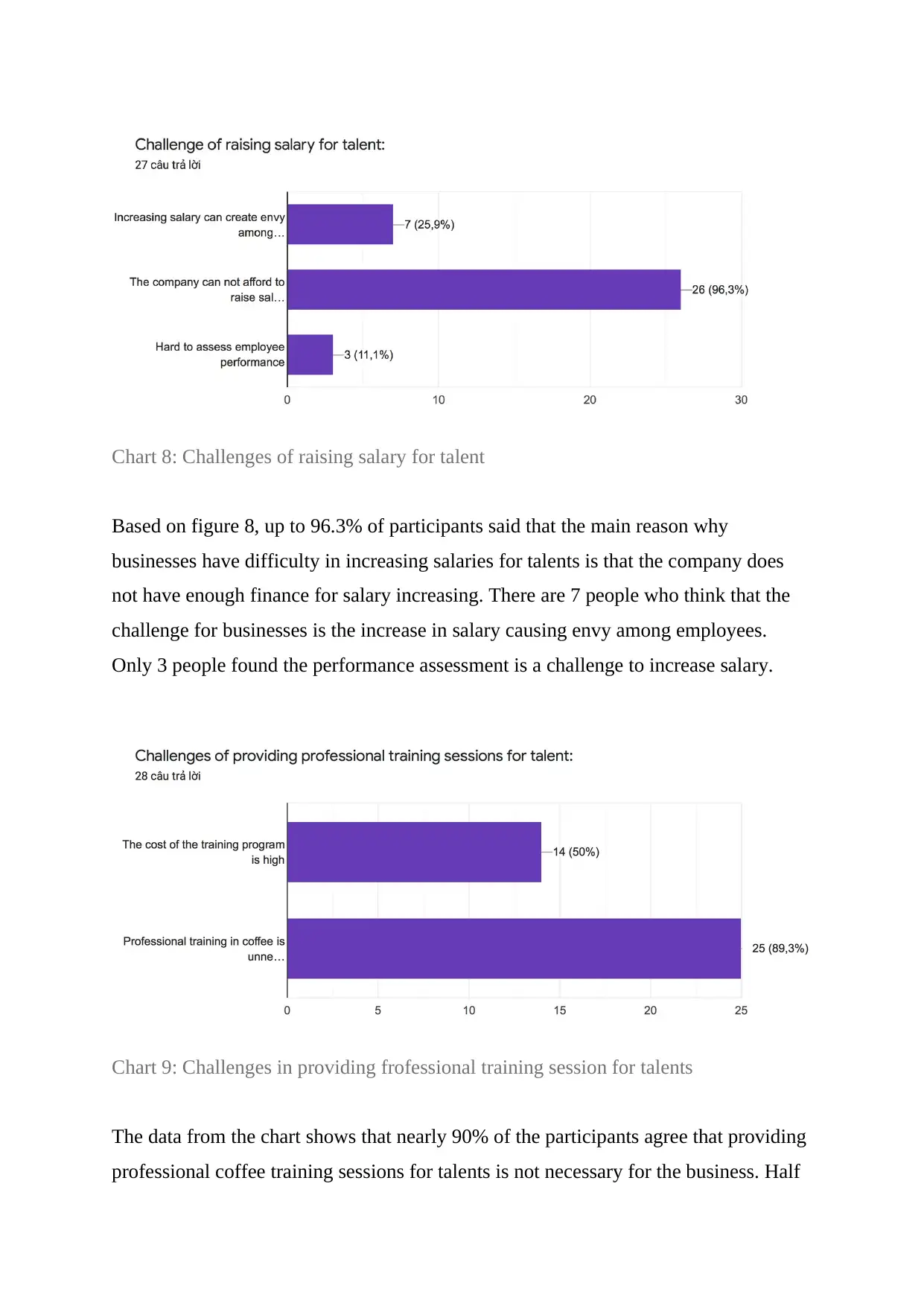
Chart 8: Challenges of raising salary for talent
Based on figure 8, up to 96.3% of participants said that the main reason why
businesses have difficulty in increasing salaries for talents is that the company does
not have enough finance for salary increasing. There are 7 people who think that the
challenge for businesses is the increase in salary causing envy among employees.
Only 3 people found the performance assessment is a challenge to increase salary.
Chart 9: Challenges in providing frofessional training session for talents
The data from the chart shows that nearly 90% of the participants agree that providing
professional coffee training sessions for talents is not necessary for the business. Half
Based on figure 8, up to 96.3% of participants said that the main reason why
businesses have difficulty in increasing salaries for talents is that the company does
not have enough finance for salary increasing. There are 7 people who think that the
challenge for businesses is the increase in salary causing envy among employees.
Only 3 people found the performance assessment is a challenge to increase salary.
Chart 9: Challenges in providing frofessional training session for talents
The data from the chart shows that nearly 90% of the participants agree that providing
professional coffee training sessions for talents is not necessary for the business. Half
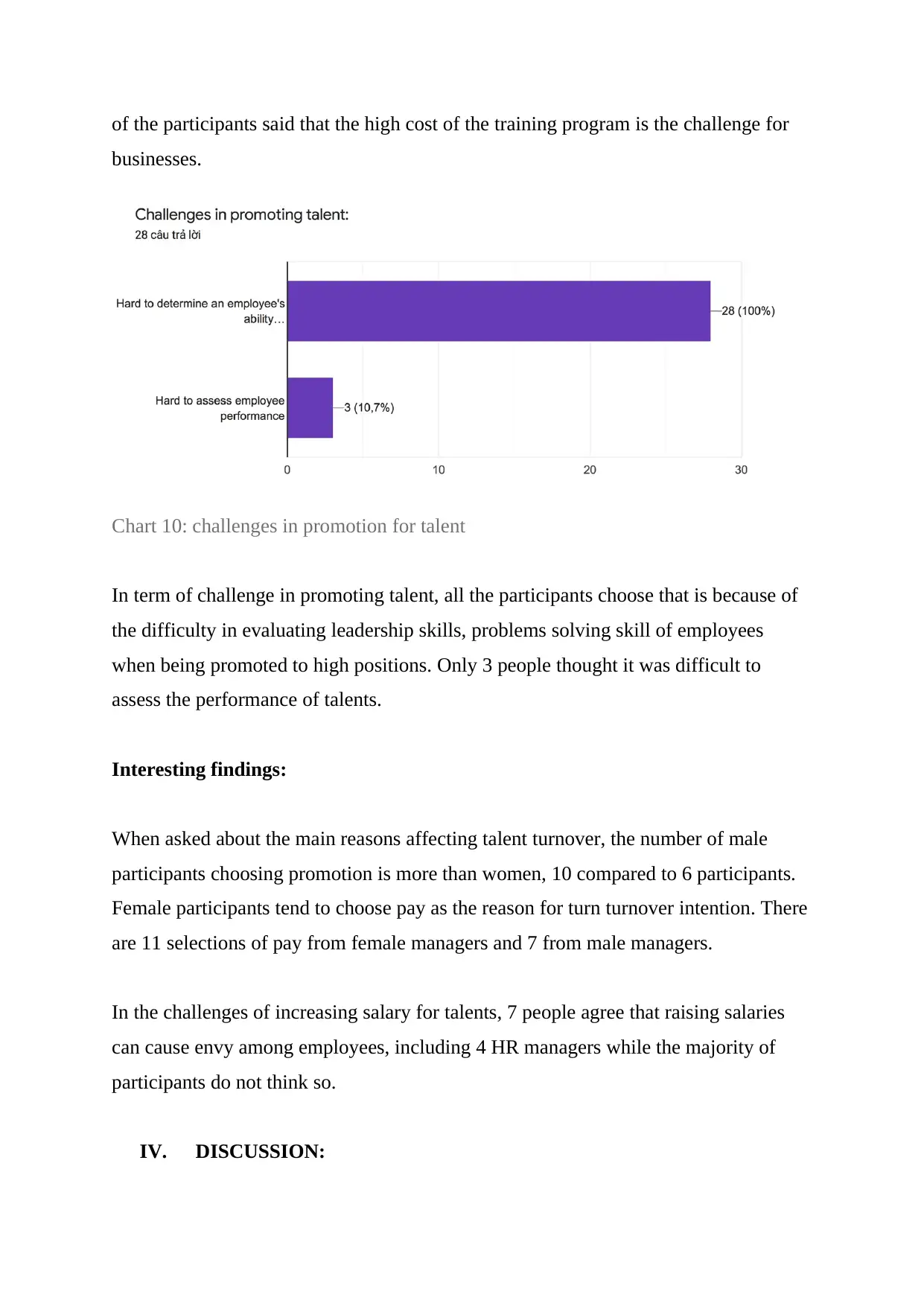
of the participants said that the high cost of the training program is the challenge for
businesses.
Chart 10: challenges in promotion for talent
In term of challenge in promoting talent, all the participants choose that is because of
the difficulty in evaluating leadership skills, problems solving skill of employees
when being promoted to high positions. Only 3 people thought it was difficult to
assess the performance of talents.
Interesting findings:
When asked about the main reasons affecting talent turnover, the number of male
participants choosing promotion is more than women, 10 compared to 6 participants.
Female participants tend to choose pay as the reason for turn turnover intention. There
are 11 selections of pay from female managers and 7 from male managers.
In the challenges of increasing salary for talents, 7 people agree that raising salaries
can cause envy among employees, including 4 HR managers while the majority of
participants do not think so.
IV. DISCUSSION:
businesses.
Chart 10: challenges in promotion for talent
In term of challenge in promoting talent, all the participants choose that is because of
the difficulty in evaluating leadership skills, problems solving skill of employees
when being promoted to high positions. Only 3 people thought it was difficult to
assess the performance of talents.
Interesting findings:
When asked about the main reasons affecting talent turnover, the number of male
participants choosing promotion is more than women, 10 compared to 6 participants.
Female participants tend to choose pay as the reason for turn turnover intention. There
are 11 selections of pay from female managers and 7 from male managers.
In the challenges of increasing salary for talents, 7 people agree that raising salaries
can cause envy among employees, including 4 HR managers while the majority of
participants do not think so.
IV. DISCUSSION:
⊘ This is a preview!⊘
Do you want full access?
Subscribe today to unlock all pages.

Trusted by 1+ million students worldwide
1 out of 22
Related Documents
Your All-in-One AI-Powered Toolkit for Academic Success.
+13062052269
info@desklib.com
Available 24*7 on WhatsApp / Email
![[object Object]](/_next/static/media/star-bottom.7253800d.svg)
Unlock your academic potential
Copyright © 2020–2026 A2Z Services. All Rights Reserved. Developed and managed by ZUCOL.



